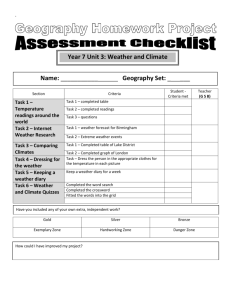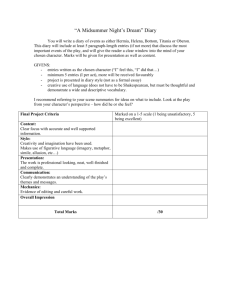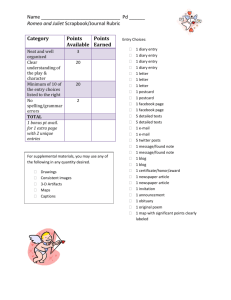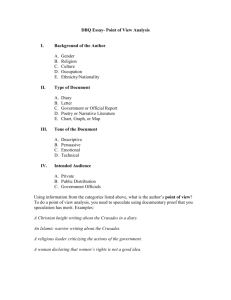Canadian Rural History
advertisement
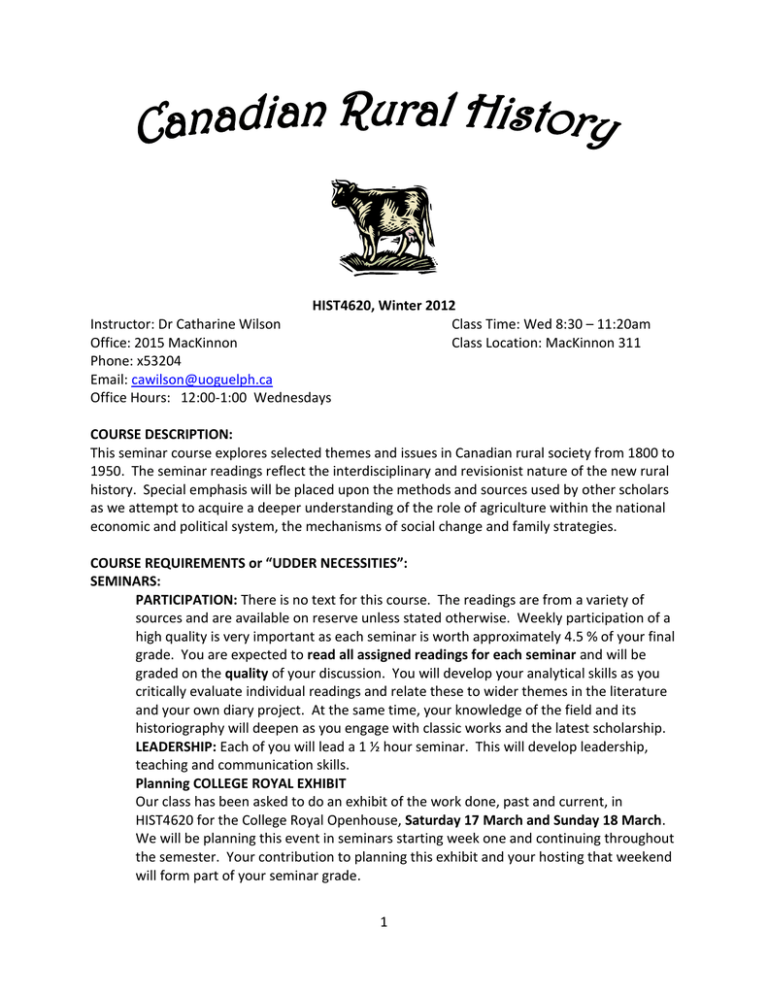
HIST4620, Winter 2012 Class Time: Wed 8:30 – 11:20am Class Location: MacKinnon 311 Instructor: Dr Catharine Wilson Office: 2015 MacKinnon Phone: x53204 Email: cawilson@uoguelph.ca Office Hours: 12:00-1:00 Wednesdays COURSE DESCRIPTION: This seminar course explores selected themes and issues in Canadian rural society from 1800 to 1950. The seminar readings reflect the interdisciplinary and revisionist nature of the new rural history. Special emphasis will be placed upon the methods and sources used by other scholars as we attempt to acquire a deeper understanding of the role of agriculture within the national economic and political system, the mechanisms of social change and family strategies. COURSE REQUIREMENTS or “UDDER NECESSITIES”: SEMINARS: PARTICIPATION: There is no text for this course. The readings are from a variety of sources and are available on reserve unless stated otherwise. Weekly participation of a high quality is very important as each seminar is worth approximately 4.5 % of your final grade. You are expected to read all assigned readings for each seminar and will be graded on the quality of your discussion. You will develop your analytical skills as you critically evaluate individual readings and relate these to wider themes in the literature and your own diary project. At the same time, your knowledge of the field and its historiography will deepen as you engage with classic works and the latest scholarship. LEADERSHIP: Each of you will lead a 1 ½ hour seminar. This will develop leadership, teaching and communication skills. Planning COLLEGE ROYAL EXHIBIT Our class has been asked to do an exhibit of the work done, past and current, in HIST4620 for the College Royal Openhouse, Saturday 17 March and Sunday 18 March. We will be planning this event in seminars starting week one and continuing throughout the semester. Your contribution to planning this exhibit and your hosting that weekend will form part of your seminar grade. 1 RESEARCH PAPERS: We will be working extensively with 19th and 20th century farm diaries from across the province of Ontario. This allows you to enter into the private sphere of individuals in the past as they went about their daily lives. You will develop detective, analytical, numeracy and other skills as you reveal the meanings found within these texts and relate diarists’ lives to their communities and the themes in the course. We will launch this project in week one and each week thereafter, part of the seminar will focus on your project’s development. D2L website for the course provides useful bibliographies and links for connecting your individual diarist with other sources and works that provide historical context. There you may also discuss the assignment with other classmates working on the same diaries. PROPOSAL: you are required to submit a two-page proposal (typed and single-spaced) of your research paper. It must include the following: - a title - a short paragraph providing 1) a brief description of the diary you have chosen, and 2) a clearly stated and carefully thought out research question - another paragraph clearly proving that your diary can answer your research question - an annotated list of other primary sources and why they are relevant - an annotated list of secondary sources (10 please) and why they are relevant to your research question. The proposal gets you thinking early about your projects and allows Dr Wilson to give you guidance as you craft your research project. Sample proposals are available on Reserve at the Library. DUE IN CLASS: Feb 8. Late Penalty of 2% per day including weekends MAJOR RESEARCH ESSAY: You are required to write a research paper based on your proposal after it has been approved by the instructor. This exercise develops your research and writing skills and gives you expertise in one area of rural history. Your essay must be based extensively on primary sources (the diary mainly but other primary material as well). This means that half or more of your footnotes need to refer to primary sources. The text and footnotes should be a total of 15 pages in length. Required appendices and bibliography are extra. The essay must be typed and doublespaced. It must have a clearly articulated thesis/argument, contain an evaluation of the diary used and relate the diary to other relevant primary sources and significant larger themes in the historical literature. It is to include maps, tables, graphs etc demonstrating a serious engagement with, and analysis of, the diary. It is also to include appendices that showcase your detective work in linking the diarist and his/her daily life with other pertinent primary sources. These appendices should include census details and a map with your diarist located on it and any other relevant primary material. PRESENTATION OF RESEARCH PAPERS/ COLLEGE ROYAL 2 Our class has been asked to do an exhibit of the work done, past and current, in HIST4620 for College Royal. We will be planning this event starting week one and continuing throughout the semester. During College Royal weekend, Saturday 17 March and Sunday 18 March, each of you will present a five minute version of your research paper to the class worth 5% of your final grade. Your own presentation provides a wonderful opportunity to share your work, get a sense of what professional academics do, and boost your public presentation skills. ESSAYS DUE: Essays are due on Monday March 26 before 10:00 am in my office MacKinnon Rm 2015. ****LATE PENALTY on Essays OF 5 MARKS OUT OF 100% PER DAY INCLUDING WEEKENDS*** MARKING SCHEME: Seminar participation, leadership, & College Royal Planning Essay Proposal Research Essay Presentation of Essay at College Royal 50% 5% 40% 5% ------------------------------------------------------------------------------------------------------------------------------WEEKLY SEMINARS Week 1 (Jan 11): Introduction to Rural History and the course Introduction to the course, your assignments, D2L resources, the diarists you will be using for the research paper, and the main themes in rural history. Students will view diaries and sign up for seminar leadership. We will also sign up for College Royal planning responsibilities. We need to create a proposal for our exhibit and entry for the published program which we will begin today. These need to be submitted next week to get the best venue and by 27 January at the very latest. Week 2 (Jan 18): Launching your Research Project, Diaries and Individual-level Tracing Reports on College Royal planning - Review College Royal Proposal and Program entry for registering this week. Readings for discussion: When reading focus on how the authors use diaries and what questions they ask of them. 1) Kathryn Carter, “An Economy of Words: Emma Chadwick Stretch’s Account Book Diary, 1859-1860,” in Acadiensis, vol XXIX, no 1 (Autumn 1999) 2) Paul Tiessen, “Mapping the modern world from pre-war Berlin to post-war Kitchener: an Introduction to Gordon Christian Eby’s poetics of life and language,” in P. Tiessen and A Millar, eds. “of course I was only an onlooker for I can’t dance: the 1911-1919 diary of 3 Gordon Christian Eby, Mennonite farmer, Waterloo, Ont: MLR Editions Canada, 2007, vxlii. Project (3 parts): Part 1 -Before class select one of the diaries and read at least one year of it. -In class you will briefly report on the diary you have selected, the potential topics it can support and the questions you are asking to probe its reliability, its making, its meaning and its usefulness. We will pool these general questions. -You will form groups according to the diary you have chosen, so that you can create a list of the main characters in your diary and divide up the census and map work for next week if you choose. You may correspond with each other on D2L in the discussion groups for each diary. There is nothing to hand in. Part 2 Students from previous classes will present their diary work and be available for questions about the project from the student perspective. Part 3 These students and I will take you to the library where you will learn how to access Historical County Atlases, the manuscript censuses, use the microfilm readers and ancestry.ca. Week 3 (Jan 25): Analytical Frameworks and Displaying Your Data. Review College Royal Plans – must have registered our exhibit by Friday. Project: -Come verbally prepared to say what your diary topic will be. -You need to hand in two things today 1) A print out of the diarist’s family in the census year most appropriate to the diary or a typed version of the census information. Show all the detailed information found in the personal census, and if available, the agricultural census. You may use the online census search tools (ie Library and Archives Canada, or Ancestry.ca) or the microfilm we looked at last week. 2) Your diarist’s lot and concession number and their location identified on an historical map or a list of where you looked but were not successful. Use the online historical atlas and directories on D2L and/or the Historical County Atlases in the basement of the library. These tasks will take several hours of searching and a properly referenced hardcopy is to be handed in to Dr Wilson. For the reference format look at the Bibliography for Diary Project on D2L. 4 Readings: Data 1) Pat Hudson, “Arranging, Rearranging and Displaying Data,” in Pat Hudson, History by Numbers: An Introduction to Quantitative Approaches (2000): 53-83. Theory 2) David Grigg, “The Nature of Peasant Societies,” Dynamics of Agricultural Change (1982), 91-100. 3) Allan Greer, Peasant, Lord and Merchant (1985) chapter 2. Week 4 (Feb 1): Household Economies: Production and Consumption College Royal – begin working on activities, exhibit, signage and volunteer hosts and speakers Project: Come prepared to verbally and quickly report on the following items: - what your research question will be for the essay and why it is doable - what secondary sources will you use that will provide local history context (use the online resources and bibliography on D2L as well as our library) - what secondary sources will provide thematic context – ie markets, women’s work etc (remember to use the course readings too) - what kinds of things can you count, map etc that are relevant to your topic Readings: Production: 1) R. M. McInnis “Perspectives on Ontario Agriculture, 1815-1930: The Early Ontario Wheat Staple Reconsidered,” in Perspectives in Ontario Agriculture (1992): 17-48 and also in Canadian Papers in Rural History vol 8 (1992): 17-48. 2) Steven Maynard, “Between Farm and Factory: The Productive Household and the Capitalist Transformation of the Maritime Countryside, Hopewell, Nova Scotia, 18691890,” in Daniel Samson, ed, Contested Countryside: Rural Workers and Modern Society in Atlantic Canada, 1800-1950 (1994): 70-100. Consumption 3) Douglas McCalla, “Upper Canadians and Their Guns: An Exploration via Country Store Accounts,” in Ontario History 97 (2005): 121-137 4) Beatrice Craig, “Consumption and the World of Goods,” in Backwoods Consumers and Homespun Capitalists (2009): 199-220 Week 5 (Feb 8): Community Order and Disorder Project: Proposals are due in class today. Late proposals are penalized 2% per day including weekends. Readings: Order 5 1) Ollivier Huber, “Ritual Performance and Parish Sociability: French-Canadian Catholic Families at Mass from the 17th to the 19th century,” in Nancy Christie, ed., Households of Faith (2002): 37-76 2) Catharine Wilson, “Reciprocal Work Bees and the Meaning of Neighbourhood,” Canadian Historical Review 82:3 (Sept 2001): 431-64 Disorder 3) Warren Elofson, “The Untamed Canadian Ranching Frontier, 1874-1914,” in S. Evans, S. Carter, and B. Yeo, eds., Cowboys, Ranchers and the Cattle Business (2000): 81-99 4) Frances Swyripa, “Negotiating Sex and Gender in the Ukrainian Bloc Settlement: East-Central Alberta between the Wars,” in James Opp and John C. Walsh, eds, Home, Work and Play first edition (2006), pgs 47-62 on reserve OR a longer version in Prairie Forum vol 20, no 2 (1995): 149-74, on regular stacks in library – FC 3231.P65. Week 6 (Feb 15): Property Meanings and Relationships Project: Come prepared to verbally report on what maps, graphs and/or tables you are planning to work on in future weeks. Readings: Inheritance 1) Kenneth Sylvester, “Continuity, Inheritance and Inequality,” in The Limits of Rural Capitalism (2001): 135-67 2) Laurel Thatcher Ulrich, “Hannah Barnard’s Cupboard,” in The Age of Homespun (2001) chapter 3, pgs 109-141. Alternative Concepts of Property 3) Catharine Wilson “Tenancy as a Family Strategy in Mid-Nineteenth Century Ontario,” Journal of Social History 31:4 (Summer 1998): 875-896 4) Gerald L. Pocius, “Property and Work,” in A Place to Belong (2001): 102-149 Week 7 (Feb 22) Reading Week, no classes scheduled Week 8 (Feb 29): Gender & Male/Female Relationships Project: Present and explain the maps, graphs, tables etc you have done. This will take a few hours to prepare. You must have at least one ready to display. Readings: 1) Gerard Bouchard, “Through the Meshes of Patriarchy: The Male/Female Relationship in the Saguenay Peasant Society (1860-1930),” History of the Family, vol 4, no 4 (1999): 397-425 6 2) Roy Loewen, “Poultrymen, Car Dealers, and Football Stars: Masculinities in Manitoba,” in his Diaspora in the Countryside (2006): 145-168 Week 9 (Mar 7): Ecological and Scientific Relationships with the Animal World Project: Sign up for getting your essay thesis (ie answer to your research question) approved by Dr Wilson this Friday Nov 4. Readings: Horses 1) Margaret Derry, “The Farmer’s Horse,” in Derry’s Horses in Society (2006): 79-97. 2) Douglas Harper, “The Machine in the Garden,” in his Changing Works (2001): 4758 Cattle 3) George Colpitts, “The Territorial Period, Game Crisis and the Western Domestication Movement,” in his Game in the Garden (2002): 38-62 4) Alan Olmstead and Paul W. Rhode, “Nature’s Perfect Food: Inventing the Modern Dairy Industry,” in their Creating Abundance: Biological Innovation and American Agricultural Development (2008): 330-60 Week 10 (Mar 16 and 17): COLLEGE ROYAL WEEK The College Royal Open House occurs on Saturday and Sunday this week so there will be no seminar readings this week. Instead we will meet during class time to put the final touches on our displays and attend to any other last minute preparations. You will be giving a 5 minute presentation on your research at College Royal and be required to contribute 6 hours of time over the weekend as the equivalent of two seminars. Week 11 (Mar 21): Home and Play Readings: Home Sweet Home 1) Peter Ennals and Deryck Holdsworth, “The Vernacular House,” in their Homeplace: The Making of the Canadian Dwelling Over Three Centuries (1998): 91-120 2) Gerald Pocius, “Interior and Exteriors,” in his A Place to Belong (2001): 227-71 Play 3) Mary-Ellen Kelm, “Riding into Place: Contact Zones, Rodeo, and Hybridity in the Canadian West 1900-1970,” in Journal of the Canadian Historical Association 18:1 ( 2007): 107-132 4) Catharine Wilson, “Plowing, Plowing Matches, and Rural Masculinity” a look at research in progress. Available on D2L. 7 Week 12: There will be no seminar since you contributed so much of your time to College Royal. ************Essays are due on Monday March 26 before 10:00 am in my office MacKinnon Rm 2015. Late essays are penalized 5% per day including weekends.***************************** Week 13 (April 4): Fashioning Farmers: Rural/Urban Constructs and Relationships Todays class will be held in the OAC Boardroom of Johnston Hall Rm 104. Readings: Fashioning Farmers 1) Daniel Samson, “Improvers” in his The Spirit of Industry and Improvement: Liberal Government and Rural-Industrial Society, Nova Scotia, 1790-1862 (2008): 250-283 2) Adam Crerar, “Writing Across the Rural-Urban Divide: The Case of Peter McArthur, 1909-24,” in Journal of Canadian Studies, vol 41, no 2 (Spring 2007): 112-137. Guest Speaker: Andrea Gal Title: “A Glimpse into the Everyday Consumption Patterns of Early Twentieth Century Rural Ontario Families” Bio: Andrea Gal is a PhD candidate at Wilfrid Laurier University Rural Roundtable Speakers Series Winter 2012 Bonus Marks This term I am running the “Rural History Roundtable,” a speakers’ series. This is an optional component of your course which gives you an opportunity to see the cutting-edge research that faculty and doctoral students in our program and academics elsewhere are doing in rural history. For each Roundtable you participate in you are rewarded with a bonus mark of 1% on your final grade. This does not include the presentation which is part of our course, week 10. The series is attached here and will be advertised throughout the Department of History and College of Arts. 8 DEPARTMENT AND COLLEGE POLICIES 1. When you cannot meet a course requirement When you find yourself unable to meet an in-course requirement due to illness or compassionate reasons, please advise the course instructor (or other designated person) in writing, with name, address and e-mail contact. Where possible, this should be done in advance of the missed work or event, but otherwise, just as soon as possible after the due date, and certainly no longer than one week later. Note: if appropriate documentation of your inability to meet that in-course requirement is necessary, the course instructor, or delegate, will request it of you. Such documentation will rarely be required for course components representing less than 10% of the course grade. Such documentation will be required, however, for Academic Consideration for missed end-of-term work and/or missed final examinations. See the Undergraduate Calendar for information on regulations and procedures for Academic Consideration. http://www.uoguelph.ca/registrar/calendars/undergraduate/current/c08/c08-ac.shtml 2. Academic Misconduct The University of Guelph is committed to upholding the highest standards of academic integrity and enjoins all members of the University community – faculty, staff, and students – to be aware of what constitutes academic misconduct and to do as much as possible to prevent academic offences from occurring. Included in this category are such activities as cheating on examinations, plagiarism, misrepresentation, and submitting the same material in two different courses without written permission. Students are expected to be familiar with the section on Academic Misconduct in the Undergraduate Calendar, and should be aware that expulsion from the University is a possible penalty. Students should also familiarize themselves with the concept of plagiarism and take the tutorials to learn what plagiarism means, and how to avoid it, at: http://www.academicintegrity.uoguelph.ca/ . If an instructor suspects that academic misconduct has occurred, that instructor has the right to examine the student orally on the content or any other facet of submitted work. Moreover, in the College of Arts it is expected that unless a student is explicitly given a collaborative project, all submitted work will have been done independently. Students have the responsibility to familiarize themselves with the Undergraduate Calendar, including Section VIII “Undergraduate Degree Regulations and Procedures” which includes a sub-section addressing academic misconduct. The URL for the Undergraduate Calendar is: http://www.uoguelph.ca/registrar/calendars/undergraduate/current/ Please read http://www.uoguelph.ca/registrar/calendars/undergraduate/current/c01/index.shtml for a statement of Students’ Academic Responsibilities; also read the full Academic Misconduct Policy (http://www.uoguelph.ca/registrar/calendars/undergraduate/current/c08/c08amisconduct.shtml). You are also advised to make use of the resources available through the Learning Commons (http://www.learningcommons.uoguelph.ca/) and to discuss any questions you may have with your course instructor or teaching assistant. Instructors have the right to use software to aid in the detection of plagiarism or copying and to examine students orally on submitted work. For students found guilty of academic misconduct, serious penalties, up to and including suspension or expulsion, can be imposed. Hurried or careless submission of work does not exonerate students of responsibility for ensuring the academic integrity of their work. Similarly, students who find themselves unable to meet course requirements by the deadlines or criteria expected because of medical, psychological or compassionate circumstances should review the university’s regulations and procedures for Academic Consideration in the calendar and discuss their situation with the instructor and/or the program counsellor or other academic counsellor as appropriate. 3. Classroom Etiquette and Useful Tools 9 To avoid distraction, the History Department requests that you turn off wireless connections during class unless requested by the instructor to do otherwise. The Department maintains a web site http://www.uoguelph.ca/history ) that will be helpful in various ways to students in History courses - such as conveying names of student award winners, information on undergraduate and graduate programs at Guelph, and the famous History Department Newsletter. There are useful links to on-line resources that include A Guide to Writing History Research Essays which will be valuable to students in all History courses. The University of Guelph History Society operates a number of programs to assist History undergraduates, and information about these programs can be accessed through the Department website or http://www.uoguelph.ca/~histsoc. 4. E-mail Communication As per university regulations, all students are required to check their <uoguelph.ca> e-mail account regularly: email is the official route of communication between the university and its students. 5. Handing in and Getting Back Assignments Unless the course instructor says so, all History papers and assignments are to be handed in at class and returned at class. LATE PAPERS may ONLY be placed through the open slots in the mailboxes of faculty members and Graduate Teaching assistants at the student’s own risk. Mailboxes for regular faculty members are located in Room 2009 Mackinnon Extension and are accessible 8.30 a.m. – 4.00 p.m. Mon.-Fri. Mailboxes for graduate students and other instructors are located in the hallway at the 2nd floor entrance to the MacKinnon Extension building from the old MacKinnon building office tower (second floor). Late papers will not be date stamped. The History department and its instructors bear no responsibility whatsoever for late papers. Under no circumstances should the wire baskets outside professors’ offices be used to deposit student papers. 6. Recording of Materials Presentations in relation to course work – including lectures – cannot be recorded in any electronic media without the permission of the presenter. 7. Drop Date The last date to drop a one-semester course, without penalty, is the 40th class day of the semester which is Friday, March 9, 2012. For regulations and procedures for Dropping Courses, see the Undergraduate Calendar. http://www.uoguelph.ca/registrar/calendars/undergraduate/current/c08/c08-drop.shtml 8. Copies of out-of-class assignments Keep paper and/or other reliable back-up copies of all out-of-class assignments: you may be asked to resubmit work at any time. 9. Final Exam Date: there is no exam. 10 RURAL HISTORY ROUNDTABLE WINTER 2012 This is the 10th Anniversary of the Department of History Rural Roundtable series, University of Guelph. Name: Dr. Catharine Wilson Title: “'Bees-Gone-Wrong': The Untold Story about Neighbourhoods and the Good Old Days of Threshing and Barn Raising Bees in Ontario" Bio: Dr Wilson is Professor of History at the University of Guelph and Coordinator of the Rural History Roundtable Date: Monday Jan 23, 2:30-4:30 Location: OAC Boardroom, Johnston Hall, Rm 104. Name: Patricia Bowley Title: "Soybeans and Ontario Crop Agriculture, 1880s-1970s: Responding to a Century of Challenges on the Farm" Bio: Pat Bowley is a doctoral candidate in the History Department,University of Guelph. Date: Tues Feb 7, 10:30-12:30 Location: OAC Boardroom, Johnston Hall, Rm 104. Name: Becky Beausart Topic: “Beyond Tea Parties and Calling Cards: Women and Domestic Leisure in Late-Nineteenth and EarlyTwentieth Century Rural and Small-Town Ontario” Bio: Rebecca Beausaert is a PhD candidate in the Department of History, York University. Date: Tuesday 28 Feb 10:30-12:30 Location: OAC Boardroom, Johnston Hall, Rm 104. Name: Dr Kevin James, Title: The Inn, the Hotel & the Tourist: Narratives of Rural Irish Travel Accommodation, 1801-1926 Bio: Dr Kevin James is Associate Professor in the Department of History; he is a member of the Scottish Studies faculty and his interests lie in Scottish and Irish tourism history and comparative social history. Date: Tuesday, 13 March, 10:00-12:00 Location: OAC Boardroom, Johnston Hall, Rm 104. Name: Andrea Gal Title: “A Glimpse into the Everyday Consumption Patterns of Early Twentieth Century Rural Ontario Families” Bio: Andrea Gal is a PhD candidate at Wilfrid Laurier University Date: Wednesday April 4, 10:00 to 12:00 Location: OAC Boardroom, Johnston Hall, Rm 104. 11
